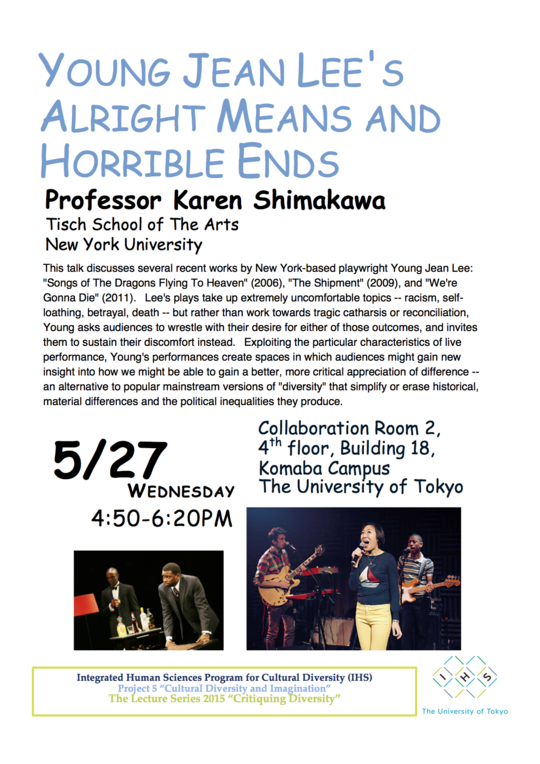- Time and Date
- 4:50−6:20PM, Wednesday, May 27, 2015
- Venue
- Collaboration Room 2, 4th Floor, Building 18, The University of Tokyo, Komaba
- Speaker
- Professor Karen Shimakawa (Tisch School of The Arts, New York University)
- Language
- English
- Note
- Admission Free; No Registration Required
- Organized by
- the Educational Project 5 "Cultural Diversity and Imagination," Integrated Human Sciences Program for Cultural Diversity, The University of Tokyo
Project 5 "Cultural Diversity and Imagination" is pleased to invite Professor Karen Shimakawa (New York University) to give us a lecture for the series of "Critiquing Diversity." We hope to create an opportunity for IHS students to interactively discuss "diversity" with Professor Shimakawa, viewing particular works at New York-based playwright Young Jean Lee. Your participation is highly encouraged.
abstract of the lecture
This talk discusses several recent works by New York-based playwright Young Jean Lee: "Songs of The Dragons Flying To Heaven" (2006), "The Shipment" (2009), and "We're Gonna Die" (2011). Lee's plays take up extremely uncomfortable topics -- racism, self-loathing, betrayal, death -- but rather than work towards tragic catharsis or reconciliation, Young asks audiences to wrestle with their desire for either of those outcomes, and invites them to sustain their discomfort instead. Exploiting the particular characteristics of live performance, Young's performances create spaces in which audiences might gain new insight into how we might be able to gain a better, more critical appreciation of difference -- an alternative to popular mainstream versions of "diversity" that simplify or erase historical, material differences and the political inequalities they produce.
- IHS students will be asked to submit a report essay after attending the lecture.
- By participating in this event, you acknowledge that you are aware that pictures, video, and audio of the event may be used for the purpose of the program.

